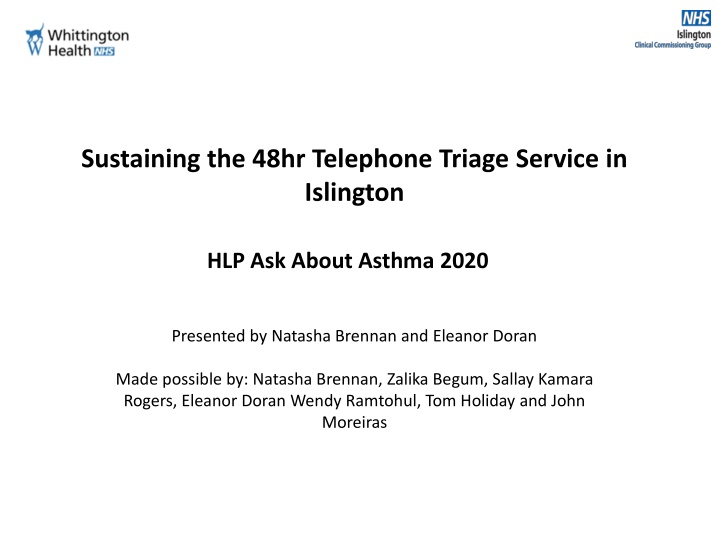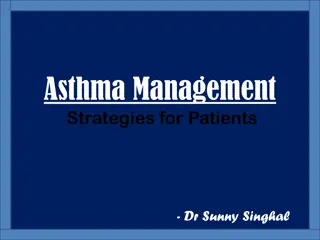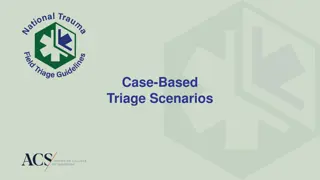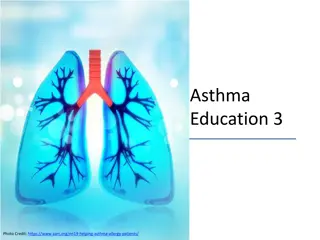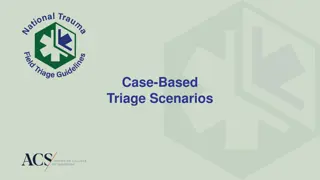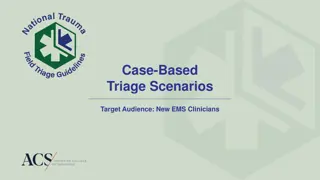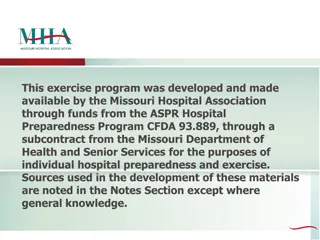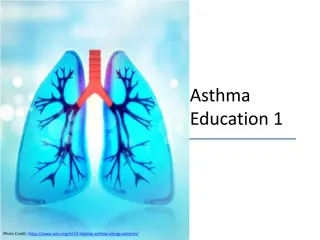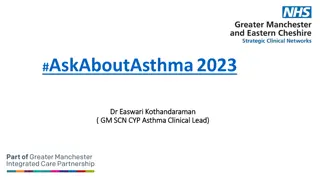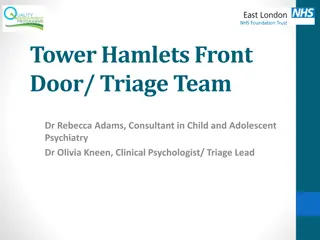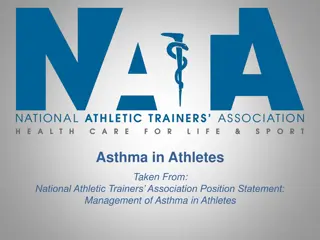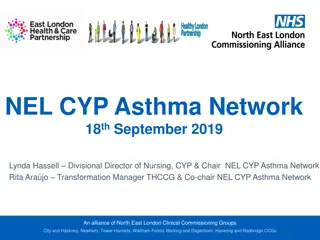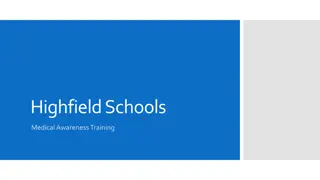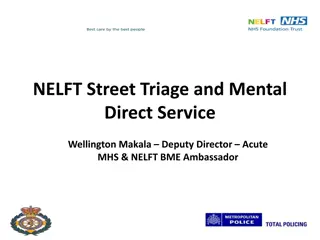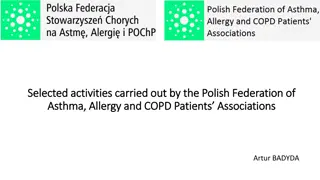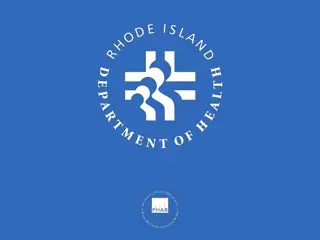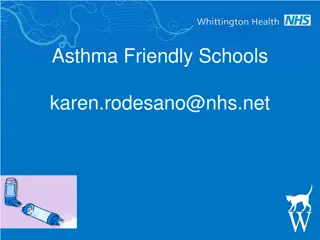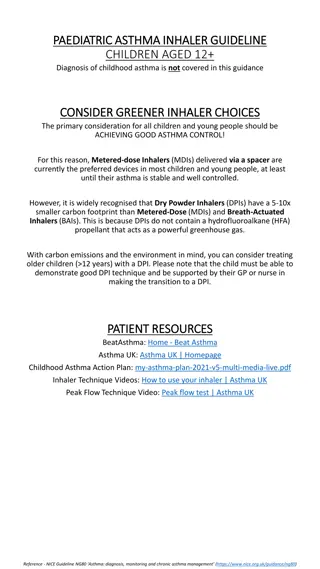Enhancing Asthma Care Through 48hr Telephone Triage Service
This presentation discusses sustaining a 48-hour telephone triage service in Islington aimed at improving asthma care and outcomes. The service includes proforma development, RAG rating, and post-attack reviews, with positive outcomes and patient safety implications noted.
Download Presentation

Please find below an Image/Link to download the presentation.
The content on the website is provided AS IS for your information and personal use only. It may not be sold, licensed, or shared on other websites without obtaining consent from the author.If you encounter any issues during the download, it is possible that the publisher has removed the file from their server.
You are allowed to download the files provided on this website for personal or commercial use, subject to the condition that they are used lawfully. All files are the property of their respective owners.
The content on the website is provided AS IS for your information and personal use only. It may not be sold, licensed, or shared on other websites without obtaining consent from the author.
E N D
Presentation Transcript
Sustaining the 48hr Telephone Triage Service in Islington HLP Ask About Asthma 2020 Presented by Natasha Brennan and Eleanor Doran Made possible by: Natasha Brennan, Zalika Begum, Sallay Kamara Rogers, Eleanor Doran Wendy Ramtohul, Tom Holiday and John Moreiras
48hr Telephone Triage Service Overview In July 2018 the Paediatric Primary Care Team expanded to include a 48hr Telephone Triage service We developed a proforma which RAG rated patients, allowing us to identify the absence of red flags and appropriate follow up care Our team receive daily emails to whh-tr.ppc48hrreview@nhs.net from both Whittington and UCL hospitals following the eligibility criteria: 18 months of age and registered with an Islington GP Asthma UK (2018) reported that only an average of 28% of CYP in London were received a 48hr review post hospital attendance, this was similar to the national average Recommendations from both NRAD, 2014 and SIGN/BTS, 2019 suggest that asthma reviews are an opportunity to assess control and optimise management accordingly NRAD do confirm that 10% of deaths occur within 28 days post discharge which indicates a review is IMPORTANT however dose this need to be within 48 hours and are we currently meeting this? A post attack review has two purposes - first to establish if the attack is resolving and identify the absence of red flags and secondly to reduce further risk with an aim to get control
48 Hour Telephone Triage Tool Formulated by and grounded in expert experience of: PPC Nursing Team Dr John Moreiras, Paediatric Consultant Whittington pead asthma Scores for Breathing, Progression, Salbutamol use and Peak Flow Generates total score 3
Triage Outcomes 4 = RED Patient deteriorated post discharge Urgent return to ED for assessment Unable to contact? No answer? 2 to 3 = Yellow Not better / Condition not improving Requires face to face 48 hour review GP or PPC review ALL patients referred through to PPC team are given a routine appointment for PPC review in PPC clinic 0 to 1 = Green Improved / Acute attack resolved No requirement for in-person review Routine f/u with PPC or secondary care 4
Summary of Outcomes 2018 Triage tool: Data suggest is safe to use Triage outcomes correlate with patient condition No evidence of adverse outcomes PPCN 48 hour review service: Achieves rates of 48 hour review double the national average Cost effective saves money on A&E re-attendance / admissions Highly rated by patients and families Makes patients with asthma safer Receiving a review after ED attendance in Islington makes you: 2.5 times less likely to re-attend A&E 3.8 times less likely to be re-admitted 5
48hr Review Telephone Triage Comparative Data 2018 to 2019 (01/09/2018- 30/11/2018 and 01/09/2019- 30/11/2019)
Overview September-November 2018 to September- November 2019 2018 2019 No. of 48hr Reviews Completed No. of 48hr Reviews Completed PPC 23, 19% 3, 3% 28% PPCN GP GP 13, 11% Not Done 79, 67% 57% Not Contactable Not Contactable 15% 2019 2018 No. of Patients referred for Asthma or Wheeze 56, 34% Asthma VIW 109, 66%
2019 September to November Data Overview Time to triage from d/c (hours) Time to F2F Review (days) Breakdown score count % Triage Category Number Avg Median Avg 25 35 Median 22 29 0 1 14 22 39% 61% Green 36 64 60 PPCN 2 3 4 4 24 4 0 0 16 1 0 0 28 10 2 0 74% 26% 100% 0% Yellow 38 54 47 Red 2 49 49 Not contactable GP 48hr Not Done 23 21 10 13 37 1 13 23 13 3 19% 11% 3% 52 57 n/a 50 46 n/a GP 61 83 14 14 PPC no triage score GP PPC Total Not seen F2F Not seen F2F 3 3% 13 79 92 1 2 0 0 2 11% 67% 78% Total Green Yellow Red Not seen F2F Not seen F2F 48hr Not Done No. Contactable Not seen F2F
Re-Attendance within 7 days of Discharge Table of Data No. of re-attendances from D/C within 7 days 2019 No. of re-attendances within 7 days of D/C 2018 Category Green 1 0 Yellow 2 2 Red 2 3 GP (no triage score) Unsuccessful 48hr review Total Total referrals Green % Yellow % Red % GP (no triage score) % Unsuccessful 48hr review % 2 0 7 0 5 10 165 0% 7% 100% 0% 11% 118 3% 5% 100% 15% 0% No adverse outcomes attributed to the 48hr Review Triage Tool in 2018 and 2019
Achieving the 48hr Review During COVID 19 Islington CCN business continuity plan (2020) identified that the 48hr review was an essential service during COVID 19 due to the fact that it would help prevent hospital re-attendance rates PPC clinics completed virtually from March 2020 to June 2020 UCLH paediatric ED closed March 2020 and patient were directed to Whittington Significant reduction in ED presentation for Wheeze and Asthma Some patients not presenting when appropriate Patients were not able to be seen face to face following the 48hr review PPC team spent longer completing the 48hr telephone reviews and scheduled more virtual follow up care for patients Due to the requirement to do virtual consultations this highlighted to have review conducted by highly skill and competent HCPs
Summary The 48 hour telephone triage determines if an attack is resolving and identifies the absence of red flags The comparative data shows that we are reaching over double the national average as recorded by (Asthma UK 2018) Our results show that the triage tool works and appropriately determines the correct place of care for our patients The tool is safe and nil adverse outcomes were identified when using the triage tool This tool has enable us to identify patients who required support with management who may have not been previously been identified This tool correctly identifies patients who need to be reviewed the same day as symptoms were not improving (appropriate ED re attendances highlighted) We are able to support families by providing a post attack review which empowers families to better manage their child following an acute attack without having to return to an acute setting GP relationships are growing and the PPC profile is recognised The 48 hour telephone triage tool has been nominated for three categories in the upcoming 2020 Nursing Times Award Currently publishing our data and gold standard work with asthma
